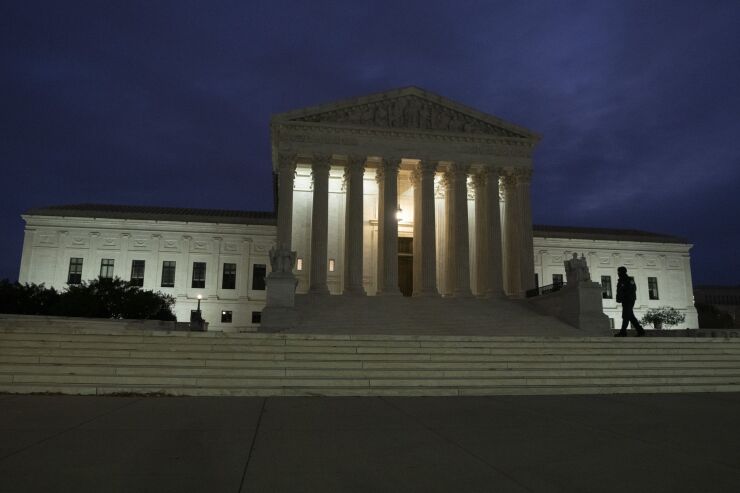The Consumer Financial Protection Bureau heads into 2020 with a full agenda but also facing storm clouds that are beyond its control.
Whether the CFPB is an unconstitutional agency will be the subject of controversy for much of the year ahead. The Supreme Court will hear oral arguments in March on the
The bureau also faces an uncertain future with the upcoming presidential election. If the Democrats win the White House, it could set up a clash between a new administration and Trump-appointed CFPB. The Supreme Court case could also factor in to whether a new
The high court is expected to rule in June. At issue is whether a president can fire the single director of the independent agency only “for cause” — as stipulated in Dodd-Frank — or whether it violates the Constitution's separation of powers.
“This issue has hung over the agency from Day 1 before [the CFPB] was even operational,” Ori Lev, a partner at the law firm Mayer Brown and a former deputy CFPB enforcement director, said during a recent teleconference. “It will be a relief for all sides to finally get some clarity on this question," but "the extent of that clarity is not certain.”

Regardless of the judicial process and electoral politics, the agency will have a full plate in Kraninger's second full year on the job.
Upon taking the job in 2018, Kraninger sought to convey a more moderate approach than her predecessor, Mick Mulvaney. For example, she halted Mulvaney's effort to rename the agency. Yet in 2019 she continued much of the deregulatory agenda that Mulvaney had begun.
In February, the CFPB proposed an overhaul of the agency's payday lending rule to eliminate a key underwriting provision. In 2019, the agency also moved proposed changes to debt collection and remittance rules, and announced a future proposal on changes to the "qualified mortgage" underwriting rule.
In July, the agency said it plans to end Fannie Mae and Freddie Mac's temporary exemption from QM; that exemption is now set to expire in 2021.
While the CFPB is expected to make progress on those regulatory initiatives in 2020, its enforcement activities will also draw a lot of attention.
Lev said a practical aspect of the Supreme Court constitutionality case is that many of the 19 enforcement cases pending in litigation have been put on hold until the high court rules.
Kraninger cited the legal uncertainty about the CFPB’s constitutionality as a key reason she took the unusual position of urging the Supreme Court
“Litigation over this question has caused significant delays to some of our enforcement and regulatory actions,” Kraninger wrote in a
The CFPB also has key personnel posts to fill in the new year. Some lawyers defending financial institutions in legal actions say key vacancies have created a vacuum in the bureau’s decision-making.
In particular, the absence of an enforcement chief has hampered the bureau’s ability to take action on some cases, lawyers said.
Kraninger has faced congressional criticism over who reportedly is the leading candidate to fill the enforcement position. The consideration of Thomas Ward, a Trump political appointee at the Department of Justice, has led to charges that Kraninger is continuing to politicize the agency.
“The potential selection of Mr. Ward for Enforcement Director raises serious concerns about whether the Consumer Bureau has adhered to civil service laws and [Office of Personnel Management] guidance governing the hiring of political appointees into career positions,” Maxine Waters, chairwoman of the House Financial Services Committee, said in a Dec. 17 letter to Kraninger.
After CFPB enforcement actions were halted under Mulvaney, they
The CFPB under Kraninger has continued to bring claims alleging "unfair, deceptive, or abusive acts or practices," known as UDAAP.
Kraninger has vowed to protect consumers and the CFPB has been aggressive in launching new investigations, so some expect she may forge her own path with more settlements and consent orders in the year ahead.
Yet the industry has also welcomed Kraninger's apparent goal to
“Supervision is the heart of this agency,” she said in an April speech.
She has eschewed big civil penalties and public announcements while generally taken punitive action against small companies accused of wrongdoing instead of big firms.
Kraninger has also pulled back from requiring that companies provide restitution to consumers. During her first year on the job the bureau roughly $12 million in restitution. That compares with roughly $12 billion collected under former CFPB Director Richard Cordray.
“It’s a whole different approach to regulation," said Joe Lynyak, a partner at Dorsey & Whitney. "When you chart $12 million versus $12 billion, that is more of a traditional banklike regulatory posture, where you tell companies to fix things."
Many experts say Kraninger has sought to avoid controversy by striking a middle ground. In her April speech, she indicated that her main focus at the bureau would be
In 2020, the agency is expected to finalize changes to the CFPB’s controversial small-dollar lending rule that will rescind ability-to-repay requirements.
The bureau also is expected to issue a final debt collection rulemaking in May that would allow collectors unlimited contact with debtors through email and text, but not require that collectors verify whether a consumer owes a debt.
The CFPB also is expected to repeal expanded data requirements in regulations governed by the Home Mortgage Disclosure Act, a move long sought by the industry.
Kraninger also is operating against the backdrop of the upcoming presidential election. If the Supreme Court rules that the CFPB is unconstitutional, and the remedy is to strike Dodd-Frank's "for cause" provision, Kraninger could be out of a job.
“There’s a lot up in the air and the long-term future of the CFPB depends on" who wins the presidency, said Jenny Lee, a partner at the law firm Arent Fox LLP. "If Trump gets re-elected, the agency will stay on its path and remain in tension between the things Kraninger wants to do and the pressures she’s feeling externally from Congress."





